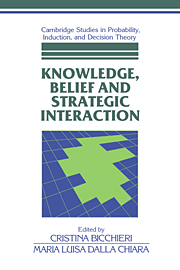Book contents
- Frontmatter
- Contents
- Preface
- List of contributors
- 1 Feasibility
- 2 Elicitation for games
- 3 Equilibrium, common knowledge, and optimal sequential decisions
- 4 Rational choice in the context of ideal games
- 5 Hyperrational games: Concept and resolutions
- 6 Equilibria and the dynamics of rational deliberation
- 7 Tortuous labyrinth: Noncooperative normal-form games between hyperrational players
- 8 On consistency properties of some strongly implementable social choice rules with endogenous agenda formation
- 9 Algorithmic knowledge and game theory
- 10 Possible worlds, counterfactuals, and epistemic operators
- 11 Semantical aspects of quantified modal logic
- 12 Epistemic logic and game theory
- 13 Abstract notions of simultaneous equilibrium and their uses
- 14 Representing facts
- 15 Introduction to metamoral
- 16 The logic of Ulam's games with lies
- 17 The acquisition of common knowledge
- 18 The electronic mail game: Strategic behavior under “almost common knowledge”
- 19 Knowledge-dependent games: Backward induction
- 20 Common knowledge and games with perfect information
- 21 Game solutions and the normal form
- 22 The dynamics of belief systems: Foundations versus coherence theories
- 23 Counterfactuals and a theory of equilibrium in games
7 - Tortuous labyrinth: Noncooperative normal-form games between hyperrational players
Published online by Cambridge University Press: 05 November 2011
- Frontmatter
- Contents
- Preface
- List of contributors
- 1 Feasibility
- 2 Elicitation for games
- 3 Equilibrium, common knowledge, and optimal sequential decisions
- 4 Rational choice in the context of ideal games
- 5 Hyperrational games: Concept and resolutions
- 6 Equilibria and the dynamics of rational deliberation
- 7 Tortuous labyrinth: Noncooperative normal-form games between hyperrational players
- 8 On consistency properties of some strongly implementable social choice rules with endogenous agenda formation
- 9 Algorithmic knowledge and game theory
- 10 Possible worlds, counterfactuals, and epistemic operators
- 11 Semantical aspects of quantified modal logic
- 12 Epistemic logic and game theory
- 13 Abstract notions of simultaneous equilibrium and their uses
- 14 Representing facts
- 15 Introduction to metamoral
- 16 The logic of Ulam's games with lies
- 17 The acquisition of common knowledge
- 18 The electronic mail game: Strategic behavior under “almost common knowledge”
- 19 Knowledge-dependent games: Backward induction
- 20 Common knowledge and games with perfect information
- 21 Game solutions and the normal form
- 22 The dynamics of belief systems: Foundations versus coherence theories
- 23 Counterfactuals and a theory of equilibrium in games
Summary
It is characteristic of social interaction that I cannot maximize my own utility without “taking into account” (in some vague sense which we understand only darkly) what you are up to. I must have some theories or intuitions about how you are likely to behave, how you will respond to my actions, and the like. Worse than that, I must be aware that you are likely doing the same thing in regard to me, and I have to take that possibility into account as well. But of course you may know that I am aware of this possibility, and…adjust your behaviour accordingly. And so it goes – we are both involved in a tortuous labyrinth of relations.…
Moore and Anderson (1962, p. 413)In this chapter I shall discuss noncooperative normal-form games between extremely rational (“hyperrational”) players. What is characteristic for such players is that they are supposed to maximize their expected utility on the basis of probability assignments that they somehow extract from the available nonprobabilistic information – from the common knowledge of the matrix of the game plus the assumptions of independence and rationality. In order to arrive at these probability assignments, the players are supposed to make use of the principle of insufficient reason.
I shall define the notion of a potential solution of such a hyperrational game: a so-called complete probabilistic equilibrium. It will turn out that some of the games of this kind lack a solution whereas others have more than one.
- Type
- Chapter
- Information
- Knowledge, Belief, and Strategic Interaction , pp. 107 - 126Publisher: Cambridge University PressPrint publication year: 1992
- 1
- Cited by



